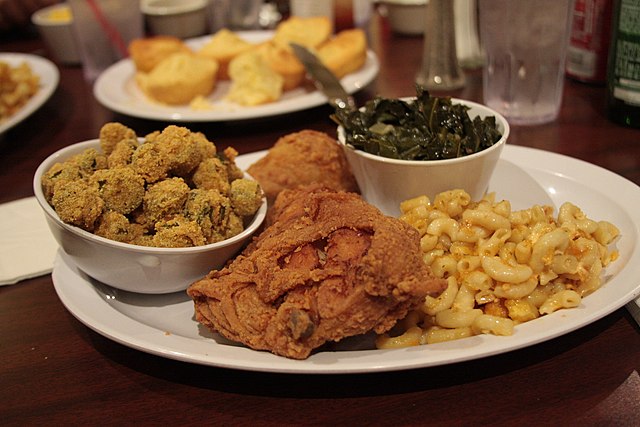Throughout the month of February, we are sharing posts written by Imagine Institute training program assistant Lourdes Flores about Black History Month. This series will follow the long history of Black History Month, Black History in the United States, and how we can all celebrate Black History Month in a way that is supportive, healthy, and, most importantly, empowering.
All About Soul Food
Soul food originated in the American south during the Antebellum period and is associated with the cuisine of the South in general. Soul food used cooking techniques from West and Central Africa, Western Europe, and Indigenous cuisine of North America.
The blend of soul food arose from enslaved peoples maintaining their culture despite slavery and blending it with the ingredients that were available to them during the period. The act of maintaining cultural practices is a huge mark of resilience, and perseverance on its own.
Soul food was originally looked down upon socially as a low-class food, until the commercialization of it. Now, it is considered a fundamental part of American cuisine, and often just associated as Southern cuisine.
It is important that we speak about the origins of soul food, and the importance that it played in subsistence and survival of both life and culture.
What is Soul Food?
Soul food uses various proteins, like rabbit, squirrels, deer, frogs, crawfish, turtles, shellfish, and crab. It also incorporated ham hocks, hog jowls, pigs’ feet, ears, skin and intestines, and generally any meat that was not consumed by Western Europeans.
The term Soul Food originated in the 1960’s and 1970’s during the Black Power Movement. One of the earliest uses of the term is found in the autobiography of Malcolm X, published in 1965.
Soul Food was a cultural point that tied African Americans back to the south after the Great Migration, often being a source of nostalgia.
Soul food restaurants were also mostly Black-owned businesses, helping bolster economic growth of African Americans amidst Jim Crowe politics and during many revolutionary movements. They also served as important meeting places, serving as cultural hubs in urban cities after the Great Migration and during the civil rights movement.

The African Influence in Soul Food
The influence can be seen in the heat levels of many soul food dishes, as well as the ingredients such as malagueta pepper and red cayenne peppers. Several foods used in soul food were domesticated or consumed in the African savanna region, and the tropical regions of West and Central Africa, such as pigeon peas, black-eyed peas, okra and sorghum.
The knowledge of how to cook rice was brought to the United Stated by Africans and became a staple to many soul food dishes like Jambalaya, and red beans and rice (popular in Louisiana).
Another parallel is the consumption of sweet potatoes in the US, which is reminiscent of the consumption of yams in West Africa.
Native-American influence
Southeastern native American culture is also an important part of Southern cuisine. Staples like corn were used to make cornbread, grits, Moonshine, and Southern whiskey (all of which are still important to the Southern economy today).
Passed-on recipes
Because reading and writing were illegal during slavery, soul food recipes and techniques were passed along orally and through families until emancipation.
The first recorded soul food cookbook: Abby Fisher’s What Mrs. Fisher Knows About Old Southern Cooking in 1881.
The National Council of Negro Women (NCNW), and organizations of the like, have produced cookbooks to fund operations and charities, funneling funds back into Black economic development and advancement. Some of these include:
Celebrating a Rich Cuisine and History – Places to Try!
Simply Soulful Café – A Black-owned business who uses the recipes of a family matriarch to bring Soul Food out to Washington. 2321 S Jackson St., Seattle
The Comfort Zone – Founded by a mother and daughter duo, they serve shrimp and grits, fried pork chops, oxtails and rice, gizzards, mac and cheese, and more! Two locations: Columbia City – 5016 Rainier Ave S. Seattle; Dakota – 3642 33rd Ave S. Seattle
Trying Other Black Cuisine
Seattle is very fortunate to have many immigrant-owned businesses that sell Halal foods of different African countries. You can also try Black Caribbean cuisine in the area. Here are some spots!
Mama Sambusa Kitchen – founded in 2009 by Marian Ahmed, a Somali immigrant who “was forced to leave everything dear to her behind in the hopes of creating a better life for her family.” Marian says that she had a difficult time navigating a male-dominated industry but persevered and opened her business to create something for her daughters that would build and carry on generational success. They suggest trying out their Sambusa! They are women, immigrant, Black, and Muslim-owned. 8319 Wabash Ave S. Seattle
Queen Sheba Ethiopian Restaurant: serves traditional Ethiopian fare and has vegetarian options! 916 E John St. Seattle
Taste of Congo – Black, immigrant, and women-owned, Caroline opened Taste of Congo after moving to the Seattle area. Her business is built on traditional recipes that she learned from her mother, who would cater weddings, parties and church programs in the Congolese capital, Kinshasa. They offer both individual service and ordering, as well as catering. 14200 Tukwila International Blvd, Suite 141 Tukwila, WA
Taste of the Caribbean – serves Jamaican cuisine. The reviews suggest trying their rice and peas, ackee, saltfish, and oxtails. 1212 E. Jefferson St. Seattle
Jerk Shack – serves Jamaican food, both individually, through catering, and meat by the pound. They also sell different sauces to take home. 1133 24th Ave, Suite N, Seattle
NEWSLETTER SIGNUP
Sign up for all the latest
news and offers
About Us
Quick Links
Get Social
© 2024 The Imagine Institute. All rights reserved.